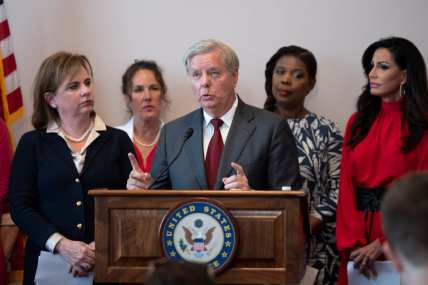Black women shouldn’t have to almost die and still go back to work
OPINION: Paid leave and other care policies are essential to ensure that Black women receive maternal health care that is comprehensive and compassionate.

Editor’s note: The following article is an op-ed, and the views expressed are the author’s own. Read more opinions on theGrio.
September is National Infant Mortality Awareness Month, a striking and sad reminder that the U.S. health care system and society at large continue to fail Black women and birthing people and their babies—with the most tragic consequences. Black women are three times as likely to die from pregnancy-related causes as white women and Black newborn babies are three times more likely to die as white newborns are. One solution that holds the potential to improve these statistics—and save and improve lives—is paid leave.
According to Stanford University, “short- and long-term health benefits include decreased incidence of low birthweight and preterm births, increased breast-feeding, reduced rates of hospitalizations among infants and improved maternal health.”
To even begin improving pregnancy outcomes for Black women and babies, policymakers and other leaders need to address the bigger picture: the rights and real-life needs of Black women and working families. This includes equitable access to health care, affordable child care and paid leave.
Both of us have had near-death pregnancy and childbirth-related experiences.
Sade’s story
When I was 28, I almost died. I was nearly full term in a healthy pregnancy when, between one second and the next, lights flashed, ER codes screamed over my head, and doctors began an emergency cesarean section before I was fully anesthetized.
My employer at the time was not legally required to comply with New York’s paid leave regulations—not surprising given that only 19 percent of the country has access to paid leave through their employer.
When I found out I was pregnant, I had fewer than 90 days on the job and was terrified to tell anyone because my boss had made it clear that time off was frowned upon. The culture at my job was, “do, don’t ask.”
When my pregnancy became more apparent, multiple uncomfortable conversations ensued, and my employer reluctantly granted me leave after making it clear that the company was doing so as a favor and not a legal obligation. I lived the following months on edge, afraid that my employer would revoke my leave.
Despite warnings from my doctor that my blood pressure was rising, I continued to work, exhausting myself constantly until the day I gave birth.
I almost died from complications due to high blood pressure. That is not uncommon for people that look like me—Black women are five times as likely as white women to die from blood pressure-related complications during pregnancy. Black women also suffer higher rates of PTSD and postpartum depression and, concurrently, receive less care from mental health professionals. Mine came in the form of constantly seeing flashing lights, feeling abdominal pain and hearing phantom crying.
Medical practitioners did not listen to me; they ignored my pain and minimized my trauma. The instability I felt given the uncertainty of having paid leave and the lack of support likely also exacerbated my health challenges.
Stress and high blood pressure go hand and hand. We work ourselves to the bone. We are underpaid, undervalued and overworked. And then, during pregnancy, we face death.
Even after my 10th week of leave passed, the PTSD symptoms and physical healing continued. I was not ready to return to work, but my choices were vanishing. My employer called to let me know I had begun to exhaust my leave. My sick time and vacation were gone; I had to go back to work.
Josephine’s story
I was a pregnant, working college student. At the time, I knew something was wrong, but I couldn’t afford to take time off from work. Tuition was due and had to be paid on time. If I took time off, I would not get paid.
When I could no longer ignore my symptoms, I went to the ER only to learn that I had an ectopic pregnancy and was septic. I had almost waited too long, narrowly avoiding death from having too much blood in my uterus.
I was given drugs for the infection and an abortion—one that will now be denied to many women because of Republicans’ desire to control women’s choices over our bodies. I felt weak and shaken afterward, but I had to go to work. I had no paid leave at my job, and I couldn’t afford to lose my pay or my job altogether. I left the hospital, slept for a few hours, and went straight back to work.
Black women deserve more.
Now, more than ever—especially given the unjust U.S. Supreme Court’s Dobbs ruling—the lack of a federal paid leave policy is affecting the health and lives of people across the country. A Duke University study predicts that abortion restrictions will increase the number of Black women who die from pregnancy and childbirth-related causes. We need policies for maternal health care that are comprehensive, compassionate, and recognize the need for structural change to save Black women’s lives.
Black women deserve more than to almost die in pregnancy and then simply go back to work. Must we live in perpetual fear? Fear of being Black in America. Fear of losing our lives during childbirth. Fear of losing our jobs if we or our children get sick? Care policies—health and abortion care, child care, and paid leave—can alleviate our fears and create a protected environment where we can thrive.

Sade Dozan is chief of operations and development of Caring Across Generations.

Josephine Kalipeni is executive director of Family Values @ Work in Washington, D.C., and a communications fellow at The Opportunity Agenda.
TheGrio is FREE on your TV via Apple TV, Amazon Fire, Roku, and Android TV. Please download theGrio mobile apps today!


